
 |
|
|
#31 |
|
Member
Join Date: Mar 2006
Location: Room 101, Glos. UK
Posts: 4,184
|
yes, it's really a ciupaga, didn't think y'all would know that distinction. from the latter half of last century. the ciupaga has the distinctive shaped head & decorated haft. (my granny was from the area)
(Slovak: valaška, Hungarian: fokos, Polish: depending on region - ciupaga, rabanica, uobuszek, cekanka, Czech: valaška, Romanian: baltag, Ukrainian: бартка, топірець) so is this one. 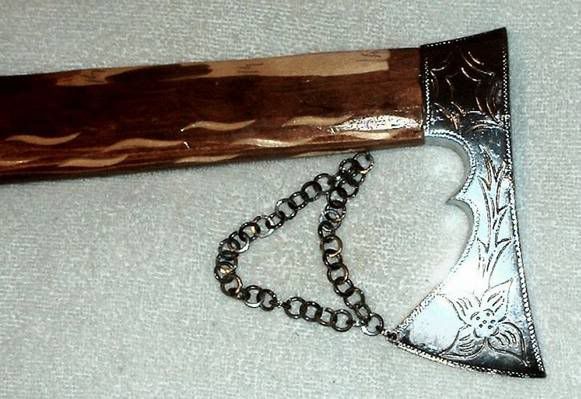  this is a proper fokos from budapest, hungary:  the fokos is more utilitarian. this one has a pattern welded head. 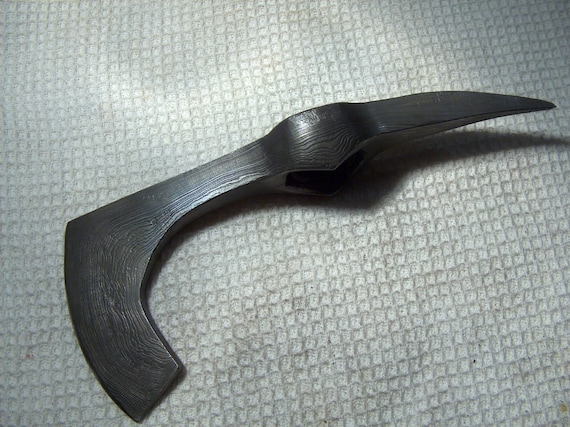 the same smith also made the head for the small poll axe in this view: it has an inserted damascus edge. i decided it would be happier as a camp axe/tomahawk rather than a fokos. 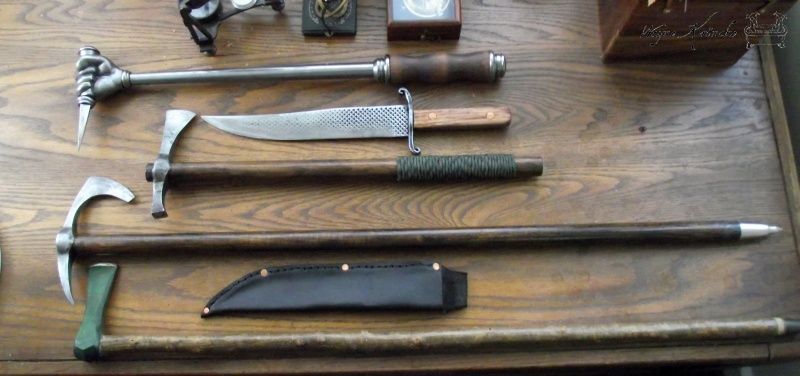 and a HC steel fokos/warhammer head i'm currently hafting. i designed it, he made it. 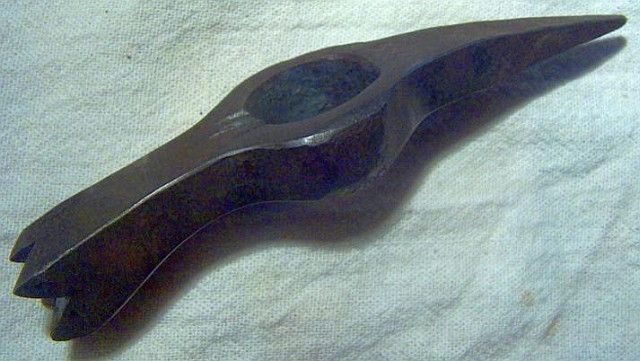 the greenish one has a small bronze axe head, from the balkans. anyway, also known in english as a 'shepherd's axe' Last edited by kronckew; 1st March 2013 at 09:00 PM. |
|
|

|
|
|
#32 |
|
Member
Join Date: Nov 2008
Posts: 332
|
I liked the last one (hammer head). Have a bunch of fokos myself. Have you seen the current production "tactical fokos" by United Cutlery? http://www.knivesanddefensedepot.com...nse/UC2905.jpg
|
|
|

|
|
|
#33 |
|
Member
Join Date: Dec 2004
Location: NC, U.S.A.
Posts: 2,097
|
Wow! Glad I resurrected this old thread! I didn't know the difference between ciapaga versus the fokos, the latter of which I'd heard of. I especially like the bullova, an ax used by the Wild Tribes in the Chotta Nagpur region of India. Always thought of getting one for a conversation piece! Thanks for posting the pic of that Brit fire ax. Here, we can see the general pattern of the evolved boarding ax as a fire tool, but with a thinner blade and spike. Appreciate it, gents!

|
|
|

|
|
|
#34 | |
|
Member
Join Date: Mar 2006
Location: Room 101, Glos. UK
Posts: 4,184
|
Quote:
|
|
|
|

|
|
|
#35 |
|
Member
Join Date: Mar 2006
Location: Room 101, Glos. UK
Posts: 4,184
|
more along the lines of this forum,
here is how my latest 3 fokos heads were made in hungary: Youtube: Fokos Making His forge is made to closely match a real medieval design. this is about as close as you can get to the real thing. his heads are (mostly) based on historical designs. i see he's added my warhammer design to his product list on his website  it's sort of historical it's sort of historical 
|
|
|

|
|
|
#36 |
|
(deceased)
Join Date: Dec 2004
Location: Portugal
Posts: 9,694
|
This is not a smith, but a Mister Smith
 
|
|
|

|
|
|
#37 |
|
Member
Join Date: Dec 2009
Posts: 140
|
Hi, CC,
yes there is some confusion about this form of fire axes. There are definitve fire axes but in WW 1 they were caried in field also. I saw an Photo of a soldier who has one of them. It will be hard to decide if one item was taken to war or not. I heard that in the early days of trench war the soldiers take what they can get from home (specially knives) Fireman will maybe take their axes often. But till today I ve never heard of one with an official acceptance mark but in the Holder maybe Dirk |
|
|

|
|
|
#38 |
|
Member
Join Date: Dec 2004
Location: NC, U.S.A.
Posts: 2,097
|
Hello, Junker. Was hoping you might pop up on this one. So now, apart from all the confusion of what is a boarding ax and what is a fire ax, we can now throw in that early fire implements were carried into war! I would imagine that boarding axes from the early era were used as early fire axes and they might have been put to use in modern warfare as well. Sigh-
 . .Goes back to what I deduced earlier. Unless it is the classic boarding pattern with govt markings, it could be a private purchase maritime boarding piece or it could be fire. No clearer answer has come to me in the last decade I've been studying these... |
|
|

|
|
|
#39 |
|
Member
Join Date: Jan 2013
Location: Scotland
Posts: 330
|
Hi Dirk, thanks for your answer to my question and yes that explains the pictures on the web of the fire axes being used in WWI. It all makes a lot more sense now - many thanks. I wonder if you have an approximate date of when these axes were first made?
Kronckew - you have some great pieces, many types I had not even heard of - I am thinking that although some may be forged today they may well become classics tomorrow. I have heard it said that almost all cultures had swords of some description and the same must be true of axes but with many 'outdoor' trades having their own variation from roofer to trapper. And amazing to think that they have been a viable weapon from stoneage flint axe to vietnam hawk. |
|
|

|
|
|
#40 |
|
Member
Join Date: Mar 2006
Location: Room 101, Glos. UK
Posts: 4,184
|
one of the lesser known roman weapons, the axe was probably more responsible for roman victories than the gladius. while not normally used for direct combat, it could, and was, so used. i have read accounts of legionaries who, when they ran out of arrows, slingshot, and pilum, threw their dolabra with great effect. one legionary retrieving his on the advance after the morale of the enemy broke which had replaced the head of a celt, noting others that had broken shields or arms. it was a bit cumbersome for the more direct close combat favoured by the legion, requiring a lot of room to swing.
the dolabra, a largish pick-axe, was however mostly used for engineering, which was a real winner of battles, entrenching, construction of roads, bridges, fortifications, siege works, and - the god of all battles - artillery. 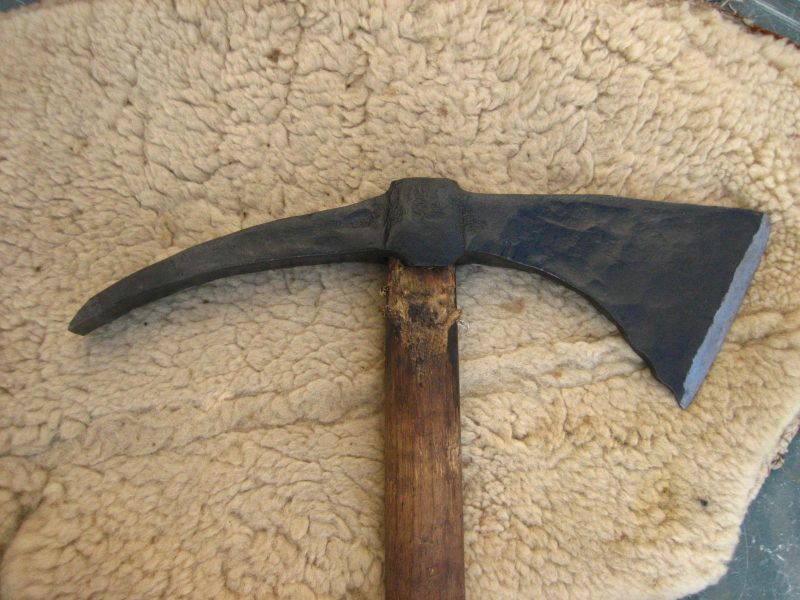
|
|
|

|
 |
|
|